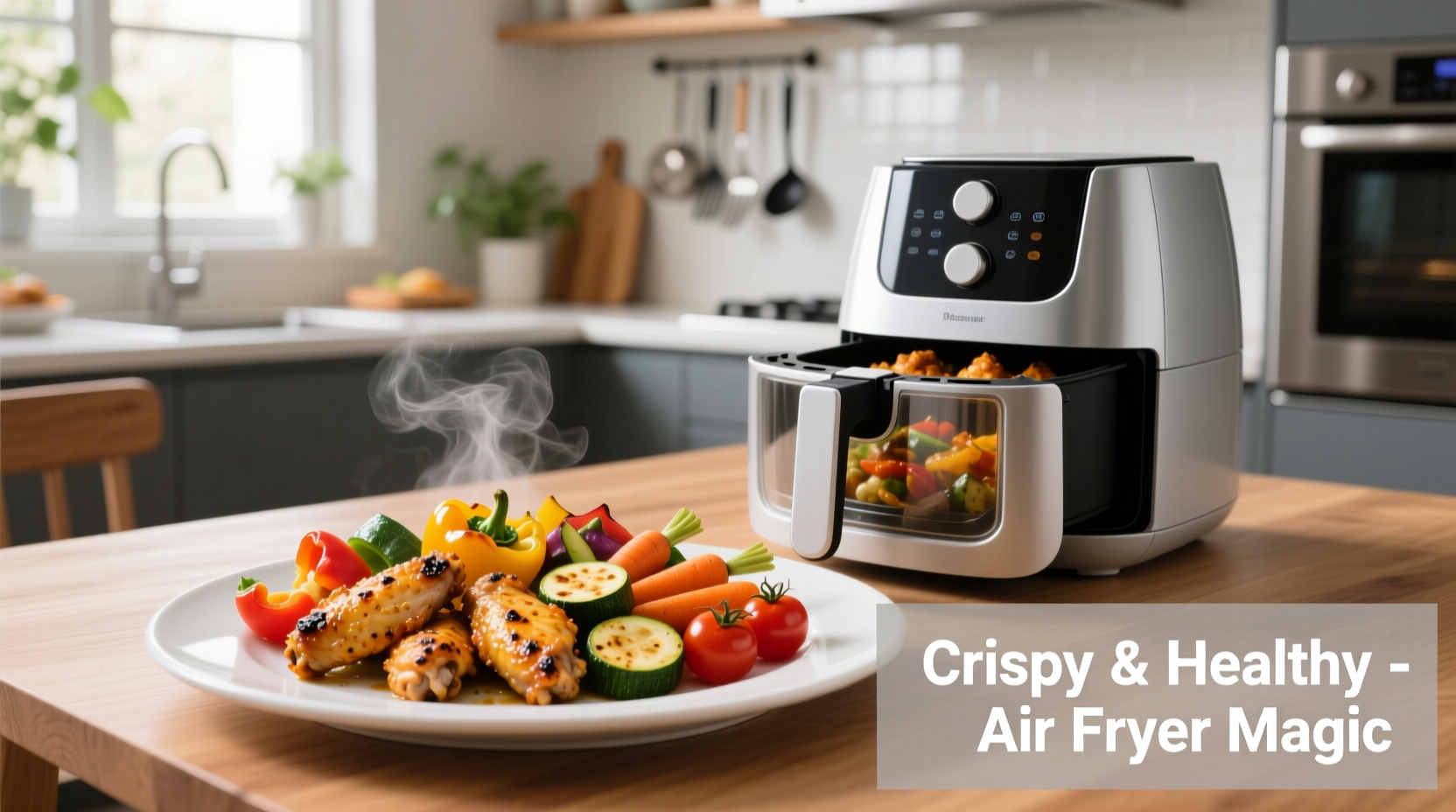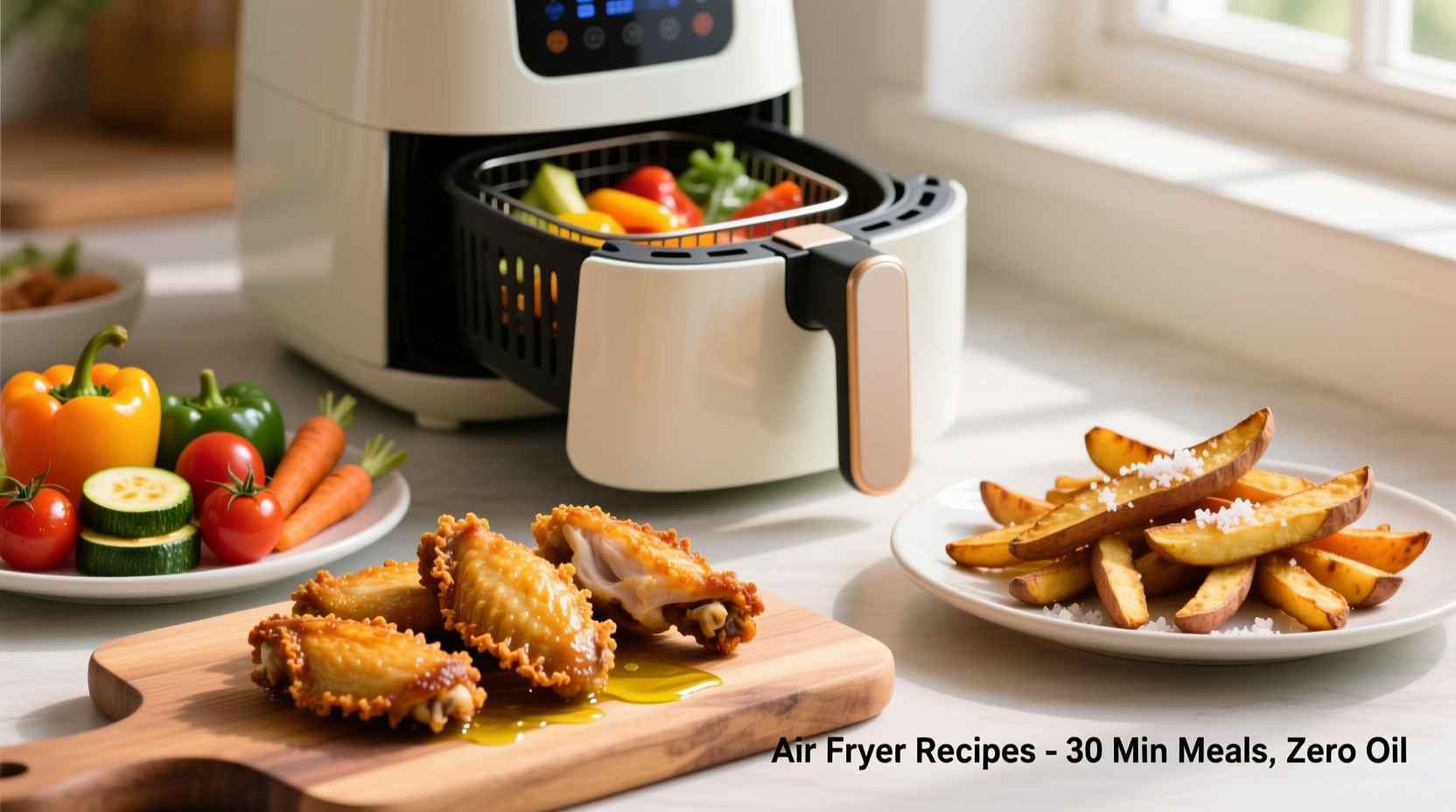Unlock your air fryer's full potential with these practical cooking solutions. As someone who's tested hundreds of air fryer recipes across professional kitchens and home settings, I've discovered the appliance transforms everyday ingredients into restaurant-quality meals with remarkable consistency. Forget limited frozen food reheating—your air fryer handles complete meals from breakfast to dessert while cutting cooking time by up to 30% compared to conventional ovens.
First-Time Air Fryer Successes
Begin with these foolproof options that showcase your appliance's capabilities without complicated techniques. Chicken wings achieve perfect crispiness in 22 minutes at 380°F with just a light oil spray—no preheating required. Frozen french fries cook in 14 minutes at 400°F, yielding golden results superior to oven-baked versions. For vegetables, try Brussels sprouts tossed with 1 teaspoon oil per pound, cooked 16 minutes at 375°F for caramelized exteriors and tender interiors.
Professional chefs consistently recommend starting with these foundational recipes because they demonstrate the air fryer's unique heat distribution. Unlike conventional ovens where hot spots create uneven cooking, the rapid air circulation ensures consistent results every time. This makes air fryers particularly valuable for busy households needing reliable meal solutions.
Daily Meal Solutions by Time of Day
Breakfast Revolution
Transform morning routines with air-fried avocado eggs (halved avocados with eggs baked 12 minutes at 350°F) or cinnamon apple slices (5 minutes at 360°F). The appliance's quick preheat time means breakfast cooks while you brew coffee—no more waiting 20 minutes for oven preheating. For meal prep, cook multiple egg muffins simultaneously in 10 minutes at 325°F.
Lunch Simplified
Create restaurant-quality salads with air-fried chickpeas (15 minutes at 375°F) that stay crispy even when dressed. Leftover proteins regain their texture when reheated in the air fryer—chicken breasts need just 3-4 minutes at 350°F versus 8-10 in a microwave. For sandwiches, air-fry grilled cheese 5 minutes at 360°F for evenly melted cheese without soggy bread.
Dinner Made Easy
Master complete dinners with minimal cleanup. Salmon fillets cook in 12 minutes at 370°F with perfect flakiness. Bone-in chicken thighs require 25 minutes at 380°F for crispy skin and juicy meat. For family meals, cook multiple protein-vegetable combinations simultaneously using rack accessories—try chicken drumsticks with sweet potato wedges (22 minutes at 390°F).
| Food Type | Air Fryer Time | Air Fryer Temp | Oven Equivalent Time |
|---|---|---|---|
| Chicken Wings | 20-22 min | 380°F | 45-50 min |
| French Fries | 14-16 min | 400°F | 25-30 min |
| Salmon Fillet | 10-12 min | 370°F | 15-18 min |
| Brussels Sprouts | 15-17 min | 375°F | 25-30 min |
Special Occasion Showstoppers
Impress guests with air-fried delights that appear complex but require minimal effort. Create elegant stuffed mushrooms (18 minutes at 360°F) or crispy pork belly bites (25 minutes at 375°F). For holiday meals, air-fry turkey breasts 20 minutes at 350°F per pound—significantly faster than oven roasting while maintaining moisture. The appliance's precise temperature control prevents the common pitfalls of dry holiday meats.
Professional kitchens increasingly incorporate air fryers for finishing touches. The concentrated heat creates perfect searing on proteins without overcooking interiors—a technique previously requiring expensive combi-ovens. Home cooks can replicate this with simple adjustments to cooking times and temperatures.

Avoiding Common Air Fryer Mistakes
Maximize results by understanding the appliance's limitations. Never overcrowd the basket—maintain at least 1-inch spacing between items for proper air circulation. Foods with wet batters (like traditional tempura) don't work well, but panko-crusted items excel. Avoid extremely liquidy dishes like soups or stews that can create smoke. The USDA confirms air fryers reach temperatures quickly but require proper food spacing for safe cooking (USDA Food Safety).
Unlike conventional ovens, air fryers benefit from mid-cooking shaking or flipping. This simple action—taking just 10 seconds—ensures even browning on all sides. For larger batches, cook in multiple rounds rather than overcrowding, as the appliance maintains optimal temperature better with proper airflow.
Proven Air Fryer Performance Tips
Implement these chef-tested techniques for consistent results:
- Preheat for critical crispiness: 3 minutes at cooking temperature prevents steam buildup
- Oil application: Use spray oil sparingly (1-2 seconds) rather than pouring
- Layering technique: Place denser foods (potatoes) below delicate items (fish)
- Cooking sequence: Cook proteins first, then vegetables in residual fat
Food science explains why these methods work: the Maillard reaction (browning) occurs most effectively between 300-400°F, precisely the air fryer's optimal range. Unlike deep frying which saturates food with oil, air frying creates a dry heat environment that evaporates surface moisture quickly, enabling faster browning with minimal added fat.
Foods That Don't Belong in Your Air Fryer
Avoid these problematic items:
- Foods with wet batter coatings (will drip and create smoke)
- Whole roasts or large turkeys (exceed capacity and block airflow)
- Rice and other grains (will dry out completely)
- Cheese-heavy dishes (will melt through basket)
Understanding these limitations prevents frustration and appliance damage. The FDA notes that proper appliance usage significantly reduces fire risks associated with cooking equipment (FDA Cooking Safety). When used correctly, air fryers present fewer fire hazards than traditional stovetop frying methods.
Frequently Asked Questions
Can I cook frozen foods without thawing? Yes, most frozen foods cook effectively without thawing—add 3-5 minutes to cooking time. This convenience factor makes air fryers ideal for quick meals.
How much oil should I use? Most foods require just 1-2 teaspoons of oil total, applied via spray for even distribution. This represents an 80% reduction compared to traditional frying methods.
Do I need special cookware? Only basket-safe items—avoid metal utensils that scratch nonstick coatings. Silicone molds work well for desserts and egg dishes.
Why does my food sometimes burn? Overcrowding or incorrect temperature settings are common causes. Always follow recommended temperatures and maintain proper food spacing.











 浙公网安备
33010002000092号
浙公网安备
33010002000092号 浙B2-20120091-4
浙B2-20120091-4